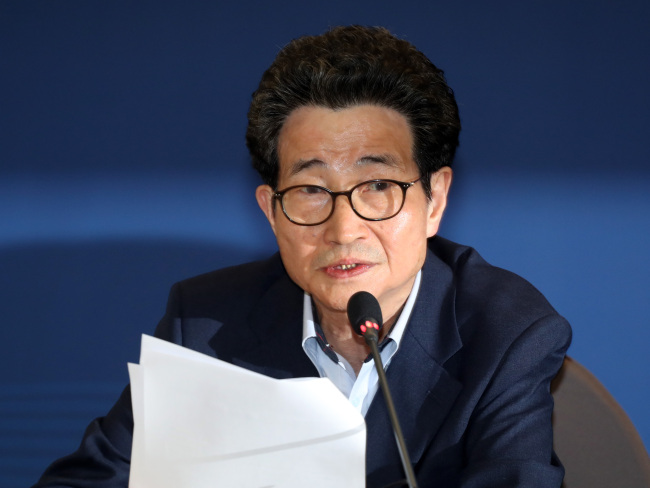South Korea aims to create some 101,000 new jobs in the biohealth, software and intellectual property sectors by 2022, seeking to respond to an aging society, boost youth employment and enhance the nation’s corporate competitiveness, according to a government panel.
The presidential job committee on Tuesday held its seventh meeting and decided to inject some 618.7 billion won ($549.6 million) into the related budget next year.
“The biohealth sector is a booming industry amid an aging society, while the software business has a high employment effect and IP directly relates to national competitiveness,” said Rhee Mok-hee, vice chairman of the presidential job committee.
 |
Rhee Mok-hee, vice chairman of the presidential job committee. (Yonhap) |
In its last meeting held in May, the committee dealt with job agendas in venture companies and transportation sectors and is set to address medical sectors in late October.
“The anticipated number of jobs based on our discussions so far amounts to 200,000 and is expected to rise up to 500,000 by year-end,” Rhee said.
“(These job creation plans) will partly take shape in the first quarter next year as the employment situation is likely to make some progress from the fourth quarter this year.”
In line with the presidential committee’s blueprint, the Ministry of Health and Welfare said that it would augment the number of jobs in the biohealth sector to 186,000 by year 2022, up 42,000 from the end of last year.
It also vowed to inject further funds into innovative technologies such as precision medical care and regenerative care, officials said.
The Ministry of Science and ICT said that it would seek to improve both the quality and quantity of software-related jobs, covering from artificial intelligence to cloud computing.
Under the goal of creating some 24,000 new jobs over the next five years, the ministry set to expanding the range of financial support for local universities specializing in software curriculum, increasing the number of beneficiary schools to 35 from the current 25. The total corresponding budget for next year will amount to 290 billion won.
The Korean Intellectual Property Office is to concentrate on supporting the innovative growth of startups and small-sized enterprises as part of a plan to directly create some 11,000 new jobs and indirectly contribute to creating 35,000 more through corporate growth, officials said. KIPO’s job creation budget has been set at 140.6 billion won for next year.
“IP industries play a key role in corporate growth and job creation, as they offer a relatively high amount of salary and sustainable business portfolio,” said an official of KIPO.
While reiterating the government’s determination for job creation, Rhee also pointed out to some of the challenges.
“Due to the drastic decrease in the labor population, we should face the fact that the number of new employees may no longer attain the former 300,000-400,000 level,” he said.
By Bae Hyun-jung (
tellme@heraldcorp.com)







![[Today’s K-pop] Blackpink’s Jennie, Lisa invited to Coachella as solo acts](http://res.heraldm.com/phpwas/restmb_idxmake.php?idx=644&simg=/content/image/2024/11/21/20241121050099_0.jpg)
